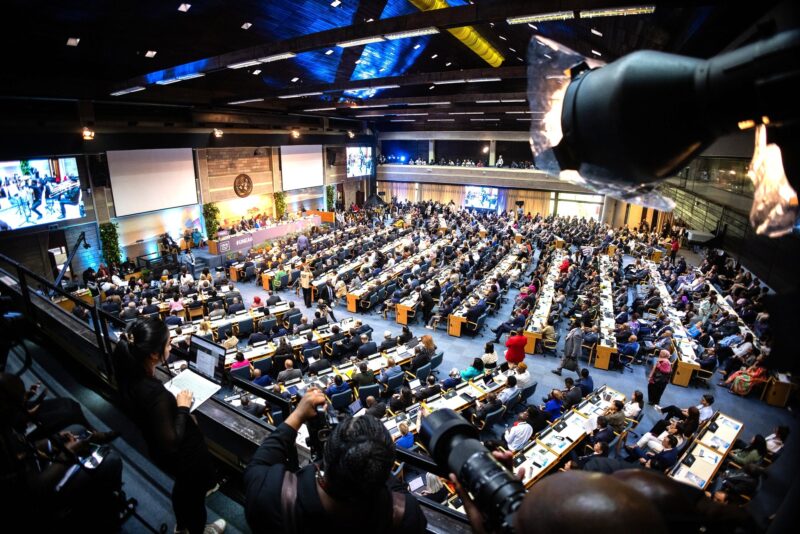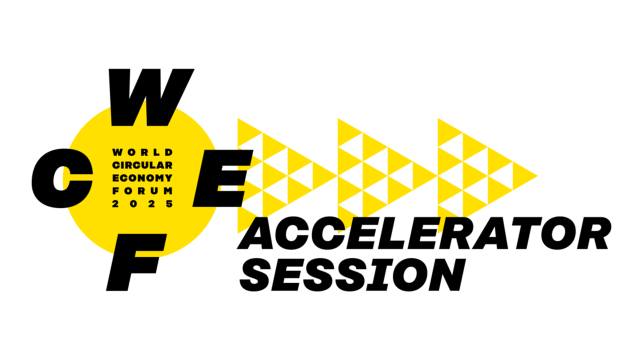Building a Community of Purpose for small business at UNEA-6
Our Country Programmes Director reports from the 6th session of the UN Environmental Assembly in Nairobi, Kenya.

The 6th session of the UN Environment Assembly took place at the end of February 2024, focusing on how multilateralism can help tackle the triple planetary crisis of climate change, nature and biodiversity loss, and pollution and waste.
I travelled to Nairobi to take part in the launch of a new moment for small green enterprises, as the Green Economy Coalition (GEC) and the World Fair Trade Organisation (WFTO) together issued a call for new ways to catalyse multilateral action for environmental sustainability through green and fair trade Micro-, Small-, and Medium-Sized Enterprises (MSMEs).
At UNEA-6, the opening statement of the Business and Industry Major Group noted that “businesses are making vast investments to address the global challenges we face. From SMEs and youth start-ups that drive local economies to the diversity of global businesses, we are delivering progressive, equitable, green, and sustainable jobs.”
“ Being an MSME is not an easy ride. Our market systems are built around ever longer and more complex supply chains to serve global markets.”
Yet UNEA struggled to follow through with this call as participant nations seemed to pull back from committing to transitioning the global economy away from linear towards circular approaches. Why was this? And what can we do about it?
We can't get big without going small
It is clear that small green enterprises play a critical role in the future sustainability of our world. Already, MSMEs form the lion’s share of employment, and in low-income countries, a huge chunk of GDP. And the beauty of MSMEs is that they are local, using local supplies to meet essentially local markets. This does wonders for equitable distribution of both services and income.
Being an MSME is not an easy ride. Our market systems are built around a concentration of players using ever longer and more complex supply chains to serve global markets. The incentive to be global militates against those whose existence is local, as financial services and market regulations orient themselves towards big firms and large contracts.
In the face of this, the natural adaptation mechanism of MSMEs has been to become informal and to rely more on local reciprocity to survive. And for any reader familiar with enterprise financing, informality is a massive no-no, deemed to be on the edge of criminality, and certainly non-contributory to economic system wellbeing. This self-reinforcing cycle consolidates both the haven-status and exclusion-of-informality for MSMEs and economies respectively.

As if that were not enough, being a green MSME is even more difficult.
While MSMEs are not green in themselves, they can be, and most want to be. Connected to the ground, and painfully aware of the direct consequences of climate change, biodiversity loss, inequality, and pollution, MSMEs are well positioned to pivot towards the provision of green services. GEC and WFTO have seen local groups stepping into new spaces to produce products through more sustainable means, to create alternative better incomes, to address eco system decline, and provide a new range of public services.
But finding ways to get paid for this work is hard in a world that values only financialised and tradeable worth. Economic and political systems need to enable them and find new ways to support the emergence of this exciting sector.
Circling the square
Circularity offers a fabulous new opportunity to do this. At the heart of circular economy is the idea to close the loop on supply chains and make them shorter. This is synonymous with localisation. Put another way, circular economic reform cannot happen without SMEs, especially local green MSMEs.
We face a profound moment in the history of our society. As the reality of multiple crisis sink into our consciousness, our world is becoming polarised along what feels like tribal lines, each jockeying for the upper hand in shaping tomorrow’s world.
Our economic crisis could be considerably reduced were there to be good local jobs based in local firms, accompanied by fair taxation systems that favoured local green production, and with fair pricing that valued the true cost of pollution, inequality, natural ecosystem decline, and emissions. But the push back against this is strong. Many are fearful of what will happen if we abandon growth-centric linear economic orthodoxy.
At UNEA, there was clear pushback against the EU’s proposed resolution to promote transition to circular economies domestically, regionally and globally. Without necessary support, and because backtracking was not an option, the EU decided to withdraw its resolution proposal.
This is a real worry. Stalling progress towards circularity is alarming. Governments can, if they choose, focus on small enterprise through the development of circular economic policies. They can explicitly recognise the importance of green MSMEs and enact legislation that enables MSME’s to be fair and green.
This means that laws and policies need to accept informality, and finance systems need to offer decent services for green MSMEs. GEC also calls for changes to global financial architecture to enable this, including requiring DFIs to set lending targets, establish joint MSME financing facilities and engage in dialogues with green enterprise stakeholders.
“ This is a real worry. Stalling progress towards circularity is alarming.”
At UNEA-6, we worked to enable this transformation. The GEC and WFTO, respectively the largest civil society network dedicated to a green economy, and the home of Fair Trade enterprises, convened to launch a new AI enabled tool designed to support the greening of fair trade enterprises. Designed by the environmental solutions platform Ubuntoo, the new platform will use collective intelligence to solve the biggest challenges that small businesses face in becoming green.
As we develop a new Community of Purpose for green enterprises, we seek new collaboration with practitioners, academics, and policy makers. Watch this space and do get involved.
- Stuart Worsley, Country Programmes Director


